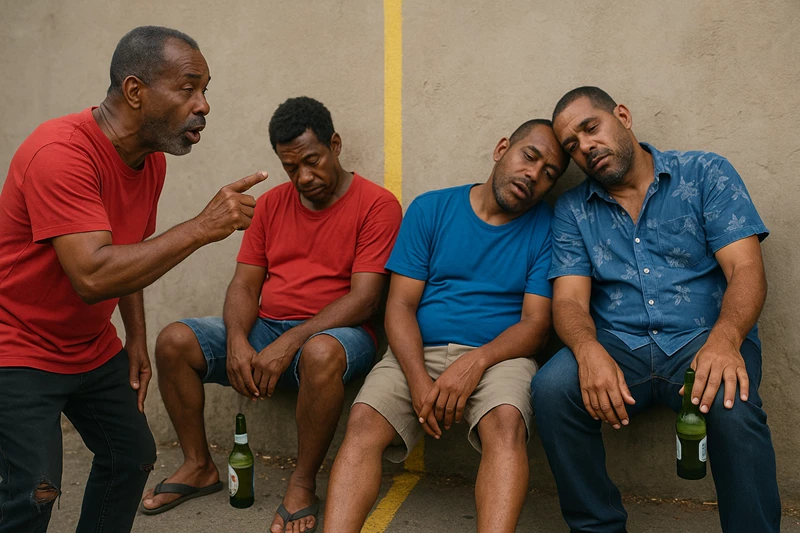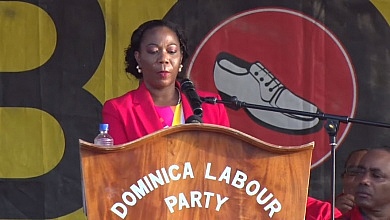
When Loyalty Blinds: The Cost of Misinformation in Dominica
GDP, Propaganda, and the Illusion of Progress
The goal here is to lay out facts, challenge the dominant narrative, and confront the growing threat of misinformation when it’s weaponized to protect failing leadership or dismiss legitimate concerns.
I have spent the last few days untangling some of the misinformation that was said in multiple post, and I have to be honest, if people are going to keep posting their love for this government, let us base it on real facts and not government press releases. I respect that people are willing to ride or die for the Dominica Labour Party (DLP), that is your call, but quoting party soundbites like gospel makes my ADHD kick into high gear, and suddenly I am in full-on, fact-check mode. Let us keep it real and leave the press release spins for the campaign trail.
I have noticed that a lot of Labour followers say, that they do not have blind loyalty, and that their choices are based on their lived reality. Labour followers believe that personal experience alone is enough to settle the facts. But let us be real about this, that so-called lived reality is shaped less by objective truth and more by a steady diet of misinformation, recycled propaganda, and selective memory.
Sure many individuals may remember Dominica before Roosevelt Skerrit and see changes today, but the mere presence of change does not automatically mean progress, and it certainly does not excuse corruption, abuse of power, or democratic backsliding. Too often, people cling to their version of reality because it feels safe, not because it is grounded in truth.
So when we challenge their perspectives, it is not to dismiss personal experience but to remind each other that reality is complex, and loyalty without scrutiny is dangerous. If we really care about the future, we ALL have to be willing to question the storylines we have been fed, even the ones we like.
Dominica’s Gross Domestic Product
A lot of the time, Labour followers throw around inflated Gross Domestic Product (GDP) figures to paint a picture of unstoppable progress, but those numbers often do not match reality. According to publicly available and reliable data, Dominica’s actual GDP in 2023 was around USD$654 million, which converts to about EC$1.7 billion, not the commonly misinformed EC$2 billion.
Dominica’s GDP is the worst in the Caribbean compared to Saint Lucia at EC$5.5 billion, Barbados at EC$17 billion, and Antigua at EC$4.6 billion. That means the average per capita GDP is only around EC$26,000 per person/per year, or just over EC$2,000 a month. And that is before paying for rent, food, utilities, and all other expenses. So what exactly are we bragging about? That number is not prosperity, it is called barely surviving.
Between 2004 and 2025, Dominica’s economy grew from EC$991 million to EC$1.7 billion, a total increase of just EC$709 million over 21 years. This translates to an average growth of only about EC$33.7 million per year. For a developing country in the Caribbean with access to regional trade, global tourism markets, citizenship by investment revenue, and international aid, this level of growth is extremely underwhelming. Especially when you consider that many of Dominica’s neighbouring islands, facing similar challenges, have made far greater economic strides in the same period.
This weak performance is a direct reflection of poor leadership and failed economic planning by the Labour government. While they have constantly promoted the idea of building the world’s first climate-resilient nation and poured funds into selective infrastructure projects, the hard data shows that these efforts have not translated into significant economic growth for the average Dominican citizen.
After more than two decades in power, this administration has failed to diversify the economy, build a strong middle class, or provide sustainable employment for the people. Most of the wealth generated through programs like the Citizenship by Investment scheme has not been transparently managed, nor has it led to widespread development across the island.
So why are Skerrit followers seriously bragging about so-called growth? That is not economic growth, that is economic stagnation, especially when compared to other Caribbean nations whose GDPs are measured in the U.S. billions year after year.
And let us not forget, these GDP numbers also do not account for wealth inequality, the selected few at the top who control most of the resources. These numbers ignore the real cost of living, which is sky-high due to heavy reliance on imports and poor or non-existent local production. They truly do not reflect youth unemployment, brain drain, or the thousands who feel they have no choice but to leave their home country to survive. Politicians and blind loyalists try to spin these numbers as proof of economic strength. But the reality is clear, Dominica’s GDP exposes deep-rooted problems, not progress.
If we want a better future, we have to stop clapping for numbers that mask the suffering of real people. It is time for serious investment in jobs, education, agriculture, housing, and real economic independence, not just passport sales and begging for foreign handouts. These GDP numbers are not a badge of honour. They are a warning sign. Dominica’s economy is not thriving, it is surviving, and just barely. There is nothing about this situation that should be spun as a success. It is not progress, it should be viewed as an embarrassment.
Dominica-China Friendship Hospital
Labour followers enjoy using the Dominica China Friendship Hospital (DCFH) as a crowning achievement. But let us think critically. This hospital was a “gift” from a regime that violates the human rights of its people. If China does not value the health and welfare of its citizens, why would anyone think they care about Dominicans? Let us not pretend that anything in this world comes without a cost. We have a hospital filled with equipment that no one knows how to use, while individuals still travel abroad for medical treatment. What is the point of a shiny building that cannot deliver on its purpose? A hospital is only valuable if it is functional.
The Chinese government’s motivation for building the DCFH and similar infrastructure projects across the Caribbean, Africa, and parts of Asia can be understood through a mix of geopolitical strategy, economic interest, and soft power diplomacy.
China is engaged in a global effort to isolate Taiwan diplomatically. By providing generous aid and infrastructure projects like hospitals, stadiums, and roads, China gains and maintains diplomatic recognition from small nations like Dominica. In return, these nations cut ties with Taiwan and formally recognized the People’s Republic of China as the sole legitimate government of “One China.” As proof Dominica officially switched its diplomatic recognition from Taiwan to China in 2004, shortly before China aid projects began here in Dominica.
The Caribbean is a strategically valuable region close to the United States. China’s growing presence here through investments, aid, and development allows it to quietly expand its geopolitical footprint in the Western Hemisphere. This presence can later serve trade, political, or even military goals.
While the hospital may be a “gift,” many Chinese-funded projects around the world are tied to economic expectations or long-term debt arrangements. Even when no direct repayment is expected, China builds relationships that can later result in favourable business contracts, construction jobs for Chinese firms, or votes in the UN and other international forums. China’s decision to build the DCFH was not simply a gesture of goodwill, but a calculated move driven by strategic, political, and economic motivations.
Cabrits Hotel
Then there is the InterContinental Dominica Cabrits Resort & Spa which is touted as another success story. A hotel that lies mostly empty for 49 weeks of the year cannot be called a success. It sees limited activity only during Independence celebrations and Carnival. Building infrastructure in the hope that “if you build it, they will come” is not a tourism strategy, it is wishful thinking. This current government has no viable plan to bring real tourism to Dominica. If they did, we would see results by now. Instead, two decades later, millions are wasted on gimmicks like a cable car, which will gather dust after locals lose interest. Other Caribbean islands are thriving tourist destinations, what is Dominica’s excuse?
The Roseau Enhancement Project
As for the Roseau Enhancement Project, let us not be naïve. The Prime Minister’s wife, Melissa Skerrit just happens to be the Member of Parliament for the very area receiving all the lavish government attention and funding. While her district thrives, other parts of Dominica struggle with basic infrastructure issues. Coincidence? I doubt it!
It is telling that no other community is receiving similar “enhancement project” money. This shows the government’s lack of intention to grow real tourism across the island. A few cruise ships stopping in Roseau each week only benefit a select few, while the rest of the country sees no revenue from these inland excursions. Cruise ships do not equate to sustainable tourism. They offer three-hour stopovers for foreigners to buy little trinkets and leave. That is not meaningful economic development.
The International Airport Underway
Many within the Labour camp hail the international airport project as a symbol of progress. But let us remember, this is the same airport project that Skerrit himself scrapped two decades ago out of spite, simply because it was not his idea. Imagine if the original airport had been completed 15 years ago, Dominica would have now been a serious contender in long-stay tourism, real tourism! But nope, Skerrit killed the progress and two decades later presented it as his visionary plan. And now his supporters cheer like he is a genius. Wake up. This was a setback disguised as progress.
Cuba Medical School
Supporters of Prime Minister Roosevelt Skerrit and his government often point to the number of scholarships being given out as proof of progress, claiming that hundreds of young Dominicans are being offered opportunities to study abroad. While on the surface this sounds like a commendable achievement, let us stick to facts.
Cuba recently awarded scholarships to 9 Dominican students. That is not hundreds, that is single digits. Yes, over the years, Cuba has supported over 400 Dominican students through its scholarship program, but these numbers span decades and include many different fields. This exaggeration is just another attempt to inflate the government’s record.
To be clear about the so-called Dominica-Cuba scholarships, these are not scholarships funded by the Government of Dominica. They are fully funded by the Cuban government as part of Cuba’s international commitment to solidarity and education. Every year, Cuba offers a limited number of scholarships to countries across the Caribbean, Africa, and Latin America, including Dominica. These scholarships cover full tuition, accommodation, and basic living expenses and are mostly focused on areas like general medicine, dentistry, and nursing.
Dominican students apply through the Ministry of Education, but the Government of Dominica is only acting as a facilitator, not a funder. It is Cuba that provides the opportunity, not Dominica. To pretend and present this as some kind of Dominican government initiative is deeply misleading. The truth is, Cuba is doing the heavy lifting, not us!
So if we are going to talk about scholarships and opportunities for young Dominicans, let us be honest about where that help is coming from. It is not a sign of Dominican economic progress, it is a reflection of Cuban generosity.
Cruise Ship Visitors
Another so-called “fact-based” statement rooted in government propaganda is the claim that Dominica received 300,000 cruise ship visitors in 2023. According to available data, the actual number was 254,200. This means the current myth making its rounds is not reporting a confirmed figure, but merely repeating a projection for 2025, a hopeful estimate from the Ministry of Tourism in the article Dominica Anticipates Record Cruise Arrivals for 2025 Season.
The reality of this claim is even more misleading as of the 254,200 passengers who arrived in Dominica on cruise ships, only about one-quarter disembarked. This makes the 300,000 figure not just an exaggeration, but a gross distortion of the truth.
Again to be clear, it is misleading to present this as a fact or evidence of government success. The truth is that any increase in cruise passenger numbers is largely due to global trends. Airline travel has become significantly more expensive since the COVID-19 Pandemic, and as a result, more tourists are opting for cruises, which offer more value for their money. This is a market driven shift, not a reflection of strategic government policy or achievement.
Furthermore, this increase of 54,200 additional cruise passengers over two decades is not a bragging point. Looking at the bigger picture, it is clear that progress remains limited. Dominica continues to rank among the least visited cruise destinations in the Caribbean, with only St. Vincent trailing behind in terms of cruise traffic. Meanwhile, regional competitors like the Bahamas welcome nearly 4 million cruise passengers annually, offering a stark contrast to Dominica’s sluggish growth in this sector.
Promoting such poor gains as major achievements is not only misleading but also insulting to the intelligence of the Dominican people. It reflects a government that is more concerned with public relations than with real, measurable development. Using government issued press releases and spinning them into so-called “success stories” without context, comparison, or honest analysis, is dishonest and irresponsible. It contributes to a culture of misinformation where narratives are carefully curated to give the illusion of progress, while the lived reality for many Dominicans tells a very different story.
This type of misleading communication should raise serious questions about the motives behind it. Why present incomplete or distorted information as fact? Is this about protecting the image of the Labour government? Are some individuals or media outlets benefitting financially or politically from echoing these talking points without scrutiny?
In any democratic society, truth and transparency are essential and when those in power or their supporters start twisting facts to serve a narrative, it signals a dangerous erosion of accountability. Dominicans deserve better than polished headlines and press releases. They deserve honesty, evidence-based planning, and a government willing to face the facts, not run from them.
The China Strategy
What I have also come to realize is that many people fail to grasp the real and growing dangers of foreign influence in Dominica, and the unfortunate role it plays in shaping our national direction. While international partnerships and investment are often necessary for small island nations, there is a fine line between healthy cooperation and outright dependency or manipulation. In Dominica’s case, that line has been crossed far too often, and the consequences are starting to show.
China’s involvement has deepened over the years, with projects like the upcoming China Shipping Depot only adding to the growing concerns. While it is true that many countries engage in strategic financing and international deals, there is a crucial difference, most do not mortgage their future by surrendering control over their key assets and sovereignty. Dominica, heavily indebted to China, risks being trapped in a cycle of dependency if this borrowing continues unchecked.
Instead of fostering sustainable growth through genuine and real tourism development and attracting diverse foreign investment (businesses), this government seems to rely repeatedly on loans just to keep things running. This is not long-term planning, it is short-term band-aiding of structural problems.
Look around the Caribbean, countries like the Bahamas, St. Lucia, Jamaica, Barbados, and Grenada have managed to build more resilient economies despite facing challenges just as tough, if not tougher. Antigua, for example, has no fresh water but boasts a thriving tourism industry. So why is Dominica lagging? Why, after two decades, does our economy still sit near the bottom rather than moving up in the ranks?
The answer lies not in the resources or potential we have because we have plenty, but in leadership and governance. Many of these islands have governments that understand how to diversify their economies, invest strategically, and create opportunities that last. Meanwhile, here, there is a failure to translate our natural advantages into meaningful progress. The writing is on the wall, and it is clear, that there is one person ultimately responsible for the stagnation and struggles of this country. It is time to wake up and demand better.
Is it a Housing Revolution?
Then there is the claim by Melissa Skerrit on May 24, 2025, that “1,911 Hurricane Maria proof houses have been built across the country to date, with over 250 more under construction, representing continued investment in housing security.”
What is truly astounding, and frankly should be alarming is the glaring contradiction in the government’s statements regarding housing development in Dominica. On February 05, 2025, Melissa Skerrit proudly announced that “Dominica’s housing sector continues to make strides in its reconstruction efforts,” and reported that 309 homes had been built to date, representing a total investment of US$40 million, or roughly EC$435,000 per home. That figure, presented by Melissa Skerrit, was positioned as a concrete update on post-Maria reconstruction progress, eight years after the hurricane devastated the island.
Yet just three months later, the number of additional new homes reportedly built during this time has inexplicably surged. Supposedly, 1,611 new homes were completed in just 109 days, a rate of 15 new homes a day, which is not only logistically impossible, but outright unbelievable given the previous pace of progress.
This wild discrepancy raises serious questions about the credibility and honesty of Melissa Skerrit and her husband’s administration’s housing narrative. How does a government go from reporting 309 homes built in eight years to suddenly claiming 1,611 completed in just three months, without a single large-scale announcement, news coverage, or community visibility on such a massive acceleration? These are not just statistical errors, they are contradictions that reek of manipulation, staged for public relations and political gain.
Moreover, if EC$435,000 was spent per home, as previously figured, the updated figure would imply nearly EC$831 million in total housing investment, a sum that is neither reflected in the national budget nor explained to the public. Where is this money coming from? Who are the contractors? Who is being housed? And why do the figures keep changing?
This pattern of inconsistent data, political exaggeration, and carefully crafted press release spins is a hallmark of this government. A government that thinks the citizens of Dominica are too stupid to notice the truth, even when it is right in plain sight.
And the most frustrating part is there are people who will buy into it without question. No matter how obvious the lies, some will repeat them, defend them, and attack anyone who points out the truth. And this is exactly what the government is counting on, blind loyalty, low expectations, and a population too distracted or discouraged to push back.
And perhaps that is why we have heard so much so much talk recently about “reforming” the education system. Not to empower a smarter, more critical-thinking next generation, but to ensure that future Dominicans are easier to mislead, easier to control, and less likely to question authority. When leaders fear an informed public, they do not invest in a system that could expose them, they invest in controlling them!
Do you Remember Monell Williams?
Finally, it never ceases to amaze me how quickly Labour followers forget the cruel and outrageous things Skerrit has said and done over the years. Do you remember when he said, “I would definitely not wish for my daughter to be a Monell Williams because I might end up short a grandchild!”?
That is not just offensive, it is disgraceful. Yet people continue to blindly defend him. The truth is, the Labour Party is no different than the UWP when it comes to throwing around insults, making baseless accusations, and spreading misleading narratives just to cling to power. The cycle of destruction and division will only stop when people stop treating their political talking points like scripture. It takes someone with real courage, someone who lives by morals, to step up and call for change.
It has become increasingly clear that many individuals are out of their depth, relying heavily on Labour Party propaganda instead of engaging in their own research or critical thinking. And while it is exhausting to constantly correct these distortions, it is even more frustrating to witness how blindly some will cling to a narrative despite overwhelming evidence and basic common sense.
Labour followers will dismiss real concerns and try to justify the government’s failures with trivial moments or half-measures that are not even real accomplishments. Sadly, I have come to accept that some people will always remain willfully blind. My only hope is that, despite our shrinking population, Dominica can one day remove this government from power and finally begin the healing process. But the facts are that the Labour Party thrives on this population decline. The fewer people there are, the less opposition they face, and the harder it becomes to remove a government that is behaving more like a dictatorship than a democracy.
This article is copyright © 2025 DOM767








